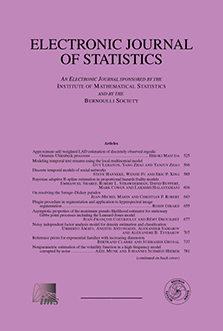Abstract
Exponential-family random graph models (ERGMs) provide a principled and flexible way to model and simulate features common in social networks, such as propensities for homophily, mutuality, and friend-of-a-friend triad closure, through choice of model terms (sufficient statistics). However, those ERGMs modeling the more complex features have, to date, been limited to binary data: presence or absence of ties. Thus, analysis of valued networks, such as those where counts, measurements, or ranks are observed, has necessitated dichotomizing them, losing information and introducing biases.
In this work, we generalize ERGMs to valued networks. Focusing on modeling counts, we formulate an ERGM for networks whose ties are counts and discuss issues that arise when moving beyond the binary case. We introduce model terms that generalize and model common social network features for such data and apply these methods to a network dataset whose values are counts of interactions.
Citation
Pavel N. Krivitsky. "Exponential-family random graph models for valued networks." Electron. J. Statist. 6 1100 - 1128, 2012. https://doi.org/10.1214/12-EJS696
Information





